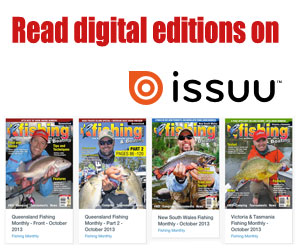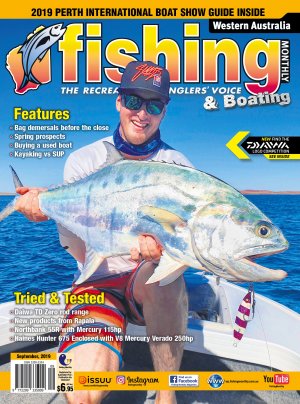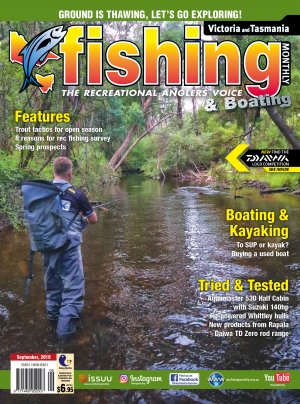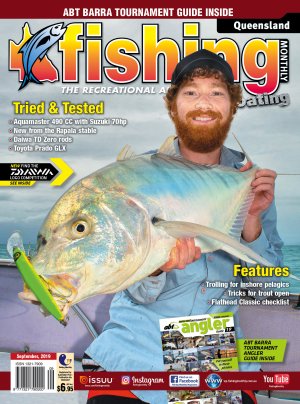This month the current will start warming up, the water will turn blue and it’s time to dust off that pelagic gear because things will start hotting up!
November is the start of our annual juvenile black marlin season and although numbers may not be as plentiful as later on in the season, there will be still a few to tangle with. Last year the run started early so hopefully it will happen again this year.
I was recently offshore and the pilchard schools are starting to come through. Along with mahi mahi, wahoo and various tuna species the small blacks will be able to be targeted consistently on most local reefs in the Gold Coast and Tweed areas. Kirra Reef, the Gravel Patch and Nine Mile reefs will always hold a few early season pelagics. Trolling lures such as locally made Black Snacks, Pakulas and one of Hawaii’s top lures, the Pula Kai, is a good way to cover ground and work areas thoroughly to try and entice these warm water speedsters.
Keep an eye out for birds, current lines and of course baitfish. These can be very reliable fish beacons in what can be a very barren ocean. If you come across a nice school of bait, especially if it is ‘balled up’, then try trolling or drifting a few livies down into the bait school. For best results try using a few of your baits with a heavy sinker attached to get them down deep, as this may entice a shy fish.
Mackerel will also be showing their faces this month with Mermaid and Palm Beach reefs always being a good start, but get out on the water early to beat those crowds. I always like to try and sound around for a few minutes to try and find some bait to anchor on. Once anchored use a light nylon coated multi strand trace of about 8” with a 2/0 or 4/0 suicide hook, and try both half and whole pillies with no weight to give those finicky mackerel plenty to choose from. It’s also a good idea to use plenty of berley, so keep those old pillies because they make fantastic berley.
The water is warming up and most snapper have moved on, but there should still be the odd nice fish around. These can be caught with great success on lightly weighted pilchard baits, live baits and soft plastics. Try the 18 and 24 fathom lines as well as the Mud Hole, as these are places that will still produce good numbers.
Cobia will still be about right through the month of November. Cobia can be taken on most live and dead baits as well as soft plastics. I try to fish live baits in varying depths, one on the bottom, one in mid water and one on the surface under a balloon. The rig I have found best for fishing live baits is a large sinker like an 8 ounce barrel sinker , which I run between a solid ring and a swivel then to about a metre of 80lb trace and then to a large hook about a 10/0 will suit most cobia baits.
There should be plenty of jacks showing their faces in November, as those hot sticky afternoons are prime jack time. All creeks and rivers are great for chasing jacks with the Nerang and Tweed being two of my personal favourites. For best results really target those rock walls and outcrops as the jacks like to position themselves hard in on the rocks. These fish can be targeted using a wide variety of lures as well as live and flesh baits. I find bouncing plastics such as McArthy shads and deep diving minnows such as the Ecogear SX60, Lively Lures - Mad Mullet and Bomber lures are a very effective way of targeting these hard hitting fish.
This hasn’t been the best flathead season as shown in this year Gold Coast Sportfishing Club’s Flathead Classic, but there will still be a few nice fish around. Those cooler days that aren’t much good for jacks are prime time for flathead and although they may have already spawned, there will still be a few nice lizards to be had. Try slowly hopping plastics around drop offs and weed edges in the main body of the rivers for best results. Like this year when the fish are shut down I’m a big fan of using blades. The Ecogear VX50 blades are one of the best of them for flathead fishing. The other technique I like to use is trolling, which has made a resurgence in the last couple of years. It is hard to go past the Lively Lures Micro Mullet when using this technique.
Whiting will be in full swing this month, and as they are a great table fish they are always a very popular option. These fish are great fun to catch and around the mouth of Currumbin and Tallebudgera creeks there should be plenty of these tasty fish to be caught. When fishing the mouth of creeks and rivers it’s pretty hard to beat a few live yabbies or beach worms as bait. The mid reaches of the Nerang River will hold a few more of those larger whiting with fish around the 40 cm mark not being as uncommon as you may think. When fishing more up the river, baits like soldier crabs, jelly prawns and blood worms being more the bait of choice. In all applications of whiting fishing a running sinker, a long trace and a size 6 chemically sharpened hook is usually the best way to target them. If you’re keen to try something different, cast small poppers over the sand flats with a nice light fluorocarbon leader to allow your popper to work most effectively.
The Hinze Dam will start to fire this month with plenty of bass and a few saratoga being caught in the early morning and late afternoons on surface lures. As it gets later in the day try ½ and 5/8 ounce Bassman Spinnerbaits around the points and weed beds. Spinnerbaits are best fished with a slow rolling action and to get the best out of your spinnerbait add a 1/0 Gamakatsu Si Wash hook with a small piece of rubber tube to turn those bites into hook-ups.
Reads: 1169
Ben and southern visitor Dave Wright with a pre-Classic flathead taken on a trolled Micro Mullet.
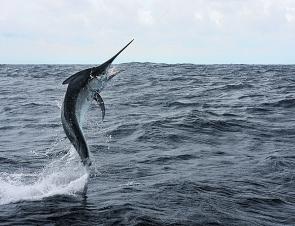
Here’s is a black marling from last year’s season going aerial. We are all hoping to see action like this soon.

